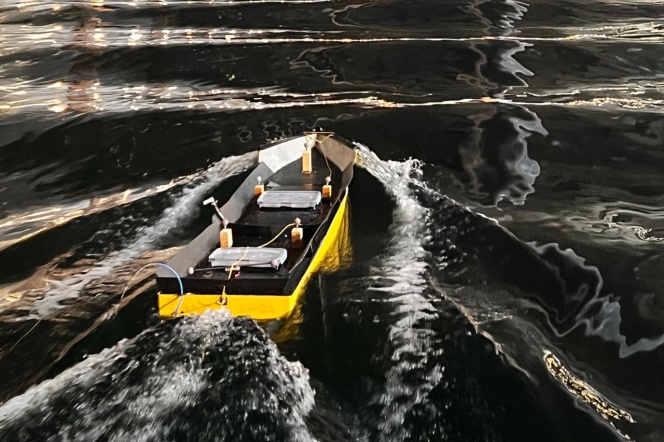Date added: 2025-05-05
Safety at Sea Above All: Groundbreaking Research on Surf-Riding

A bichromatic wave, which is irregular and consists of two overlapping waves, can pose a threat to a ship navigating through it. The vessel may, for instance, lose its course stability—suddenly and uncontrollably changing its course, orienting itself sideways to the wave, and capsizing.
The phenomenon of surf-riding can be compared to surfing on a board. Just as a surfer “catches” a wave and rides it, a ship similarly "slides" off the wave, accelerating due to the force of the wave.
"Surf-riding occurs when a ship sails on a following wave, meaning a wave coming from the stern, with the wave’s force being strong enough to accelerate the vessel to the point where it begins to move together with the wave. Ships that are particularly vulnerable to surf-riding are fast and short vessels, primarily fishing boats, pilot boats, recreational and rescue boats," explains Professor Przemysław Krata, the project leader.
The research team conducted experimental work, performed by Michał Struk, MSc, Eng. Numerical simulations were prepared by Katarzyna Warnke-Olewniczak, MSc, Eng. The experiments conducted and international collaboration have yielded results that are unique on a global scale. There are existing theories that accurately predict and allow the study of surf-riding on regular waves. However, the motion of the sea is not regular, and the forces acting on the ship are constantly changing. A theory, recently developed by scientists from Greece and the United States, allows for the prediction of ship behavior on bichromatic waves, although it has yet to be tested in practice. Thanks to the research conducted by scientists from the Faculty of Mechanical Engineering and Ship Technology, it has become possible to test this theory. The experiments carried out by the researchers at Gdańsk Tech cover various scenarios of ship movement for different bichromatic wave parameters and ship speeds.
"Until now, no one in the world has conducted such research. We hope that the results will significantly contribute to understanding surf-riding on irregular waves. Our American partners from the Office of Naval Research (ONR) and ONR Global will receive valuable results, the Institute of Naval Architecture of Gdańsk University of Technology will expand its scientific achievements at the highest level, and our doctoral students will successfully defend their theses," explains Professor Krata.
Initially, the research was conducted in a model basin at the Faculty of Mechanical Engineering and Ship Technology, which prepared the scientists for large-scale studies at the Ship Technology Centre in Gdańsk. The research program is funded by two American institutions: the Office of Naval Research based in Washington and the Office of Naval Research Global with an office in Prague.

